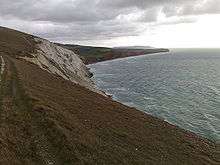Compton Bay


Compton Bay is a bay located on the southwest section of the Isle of Wight, England. The northern edge of the bay is defined by a distinctive white chalk cliff called Freshwater Cliff, named after Freshwater Bay which is located next to them and forms a small cove, with the village of Freshwater situated just behind it. The eastern edge of the bay is formed from soft red and orange cretaceous rocks that are rapidly eroding.
Due to the lack of grazing on the cliffs above the bay, the native chalk ecosystem has thrived. Atop the cliffs, the Island's county flower, the Pyramidal orchid, can be encountered, while the rare Glanville Fritillary butterfly also lives in large numbers that are supported by the native flowers. Other hardy plants such as Common Gorse bushes and Wild cabbage can also be found.
The bay is popular with wave and kite surfers due to the reliable and consistent waves that form when the prevailing south-westerly wind is blowing onshore. The beach is gently shelving and consists mostly of sand. The public facilities at the car park are owned by the National Trust.
There are dinosaur footprints visible in Compton Bay when the tide is low this is one of the best areas to see the dinosaurs of the Isle of Wight. Fossil hunters can often be seen during the summer months searching for such finds. At high tide the sea covers the beach almost completely.
The Isle of Wight Coastal Path runs along the cliff edge for the entire extent of the bay.
Afton Down Obelisk
Atop Afton Down, roughly halfway between Brook and Freshwater Bay, a small obelisk can be found overlooking the bay. It is inscribed with a memorial to a resident of one of the nearby villages who fell from the cliff to his death in 1846. This obelisk was Grade II listed in 1994.
"E.L.M. Aged 15
He cometh forth like a flower and is cut down.
He fleeth also as a shadow and continueth not.
Erected in remembrance of a most dear and only child who was suddenly removed into eternity by a fall from the adjacent cliff on the rocks below.
28th August 1846.
Each side of the obelisk is inscribed with biblical passages in relation to the afterlife.
-

Compton Bay looking north west to Tennyson Down
-

Shore at the southern end of Compton Bay
-

Low tide at Hanover Point
Surfing
Compton Bay is the Isle of wight's most famous surf spot,[1] With a choice of a rocky reef break or a slightly tamer but heavier sandbar break to choose from Compton Bay is the Island surfers spot of choice,[2] Compton Bay has proved to be a valuable playground over the years to some of the Island's best surfers such as Johnny Fryer,[3] Joe Trueman,[4] Dave Gray,[5] Ray Hutchings, Alan Reed, Dylan Gray[6] and Zoe Sheath [7]
Coordinates: 50°39′43″N 1°29′24″W / 50.662°N 1.49°W
References
- ↑ "Isle of Wight - Compton Surf Report, Surf Forecast and Live Surf Webcams". magicseaweed.com. Retrieved 2 August 2016.
- ↑ "Search for "compton" - Wight Surf HistoryWight Surf History". wightsurfhistory.co.uk. Retrieved 2 August 2016.
- ↑ "Johnny Fryer — Official website of the UK Pro Surfer". web.archive.org. Retrieved 2 August 2016.
- ↑ "Search for "joe truman" - Wight Surf HistoryWight Surf History". wightsurfhistory.co.uk. Retrieved 2 August 2016.
- ↑ "Search for "Dave Gray" - Wight Surf HistoryWight Surf History". wightsurfhistory.co.uk. Retrieved 2 August 2016.
- ↑ "Search for "Dylan Gray" - Wight Surf HistoryWight Surf History". wightsurfhistory.co.uk. Retrieved 2 August 2016.
- ↑ "Search for "Zoe Sheath" - Wight Surf HistoryWight Surf History". wightsurfhistory.co.uk. Retrieved 2 August 2016.